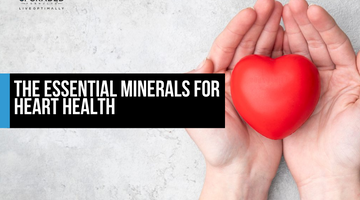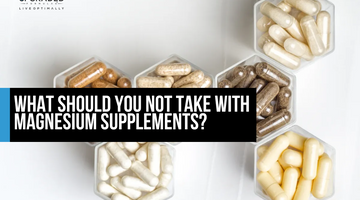potassium
Can Potassium Prevent Headaches?
Your head hurting? A lot of people go for magnesium supplements or muscle relaxants. But did you know potassium is a helpful mineral for headaches too? Potassium can help take away the tension and pain that comes with headaches.
Can Losartan Deplete Your Nutrients?
Have high blood pressure? Many people take Losartan. It is a medicine mainly used for high blood pressure. Doctors also use it to help protect kidneys in people with type 2 diabetes. Losartan is part of a group of drugs called ARBs. These drugs block the action of angiotensin II. This is a chemical in the body that makes blood vessels narrow. When losartan blocks angiotensin II, the blood vessels stay more open. This helps lower blood pressure. It also makes it easier for the heart to move blood around the body. Losartan is given to manage high blood pressure. It helps people with diabetes who have protein in their urine to protect their kidneys. Sometimes, doctors give it to people for heart failure or to help after a heart attack.
Can Potassium Help With High Blood Pressure?
Nearly half of adults in the U.S.—about 122.4 million people—live with high blood pressure, also called hypertension. This is when your top number in a blood pressure reading is 130 or higher, your bottom number is 80 or higher, or you take medicine for high blood pressure. High blood pressure is more common as people get older. About 23.4% of people age 18 to 39 have it. That number goes up to 52.5% for those age 40 to 59. For people 60 or older, it is 71.6%. Men get high blood pressure a little more than women do, with rates of 50.8% for men and 44.6% for women.
Always Thirsty? You Might Be Missing Minerals!
Have you ever been in a state where you are constantly drinking fluids, whether it be water, juice, milk, and nothing seems to quench your thirst? While constant thirst can most definitely be a sign of a serious condition, it can also be indicative of requiring extra minerals- whether it be a specific one or a blend of trace minerals. Today, we thought we'd explore that and help you understand the potential causes of your unrelenting thirst!
How Do You Know If You're Iodine Deficient On A Hair Test?
Ever wonder why iodine, or rather any halogen, isn't tested on a Hair Tissue Mineral Analysis (HTMA)?
Well, halogens are gases. In their pure form, they usually come as pairs of atoms stuck together—like F₂ or Cl₂.
Can Potassium Reduce Arterial Stiffness?
Arterial stiffness is a major risk factor for heart disease and other health problems that can sneak up on you as you age. Think of your arteries like rubber bands that lose their bounce over time. This isn't just an issue for older folks - it can start earlier than you might expect. But don't worry, there are ways to fight back and keep your arteries healthy through lifestyle changes and a healthy diet. Eating foods rich in potassium, like bananas and orange juice, can be a secret weapon in maintaining flexible arteries. A healthy eating plan with plenty of fresh fruit and vegetables, along with regular exercise (like a week of moderate aerobic exercise), can help lower your risk of heart disease. By making smart choices and keeping an eye on your body mass index, you can work towards lowering high blood cholesterol and keeping your arteries in good shape.
Can A Potassium Deficiency Make You Susceptible To A Stroke?
Imagine if eating a banana could help keep you from having a stroke. Sounds crazy, right? But it's not far from the truth. Strokes are a big deal in the U.S., affecting about 7.6 million adults. That's a lot of people! And here's the kicker: many of us need more potassium, a super important mineral that our bodies need. Most Americans only get about half the potassium they should each day. Why does this matter? Well, potassium does a ton of cool stuff in our bodies, from helping our muscles work to keeping our hearts healthy. But the most exciting news? Recent studies show that getting enough potassium helps prevent strokes.
Can Low Potassium Cause Dry Skin?
Have you ever wondered why your skin feels dry and itchy, even when you drink tons of water? Low potassium levels, an essential electrolyte that helps regulate PH levels and supports amino acids in your skin, might be your missing secret ingredient. This fantastic mineral doesn't just quench your thirst – it helps your body’s cells hold onto water, keeping you hydrated from the inside out. But potassium does way more than that. It's like a superhero for your body, helping your nerves, muscles, heart, and even your bones work better.
Can Potassium Support Kidney Health?
Did you know our kidneys do much more than you might think? They're not just filters for your blood - they're like the body's superhero team, keeping everything in balance. Healthy kidneys are always on the job, from controlling your blood pressure and phosphate levels to ensuring your muscles work right. But here's the thing: sometimes our kidneys need a little help to stay healthy, especially from a nephrology perspective.
How Are Blood Sugar and Sleep Connected?
We all know getting a good night's sleep is essential for our well-being. However, many people need to realize just how crucial sleep is for various aspects of health and functioning. Quality sleep is vital for physical health, cognitive performance, emotional regulation, and long-term disease prevention. It allows the body to repair and regenerate tissues, maintain a healthy heart, and manage weight.
Why Minerals Are essential For Heart Health?
For many individuals, heart health is often oversimplified to the mantra of "exercise more, eat less cholesterol, and limit your salt intake." While these pieces of advice do hold some value, they barely scratch the surface of the broader and often under-explored intricacies of heart health. More importantly, this standard advice usually neglects one critical aspect of overall cardiovascular health: the central role of essential nutrients, particularly minerals like vitamin E, in maintaining a healthy heart.
What Should You Not Take With Magnesium Supplements?
In today's health-conscious society, supplements have become popular to support our overall well-being. Magnesium supplements, in particular, have gained attention for their potential health benefits as a dietary supplement. However, it's essential to understand that not all supplements can be taken with magnesium. In this blog, we will explore the role of magnesium in the body, the consequences of magnesium deficiency, and the different forms of magnesium supplements available.













